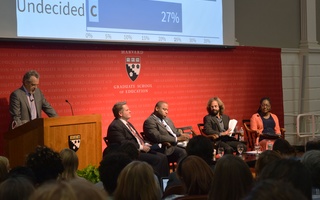Throughout her confirmation hearings, then-nominee for Secretary of Education Betsy DeVos confirmed her dearth of experience in public education as a student, teacher, administrator, or public official, demonstrating an utter lack of understanding of education policy. Yet on Tuesday, Feb. 7, DeVos was confirmed as the Trump administration’s Secretary of Education, following a 50-50 confirmation vote that allowed Vice President Michael Pence to cast the deciding vote in DeVos’ favor. This was the closest vote for a cabinet position in Senate history, suggesting that DeVos was so unqualified that even in a conservative Congress, two Republican Senators decided they could not vote for her.
Despite her lack of qualifications, we sincerely hope that Secretary DeVos will succeed, but we remain concerned about the policies she intends to implement. Indeed, DeVos’ confirmation will have a profound impact on our community through the future generations of Harvard students who will be the product of a public education system she shapes. We are particularly concerned by her indefatigable commitment to charter schools, illiteracy in measures of student achievement, and ignorance regarding student loans.
It is true that charter schools have been successful alternative options for students in areas with underfunded or underperforming public schools. We previously opined that raising Massachusetts’ charter schools cap would be beneficial to students, particularly those from minority and low-income families. However, DeVos’ dogmatic and one-size-fits-all commitment to charter schools is troubling, especially given that she does not acknowledge the failures along with the success stories. She advocated their spread in Michigan even though that state's charter schools have performed below the state average in reading and math.
This blindness to the performance of some charter schools is exacerbated by her illiteracy in the terms that measure school success and student achievement. In her hearing, DeVos failed to articulate the difference between "growth" and "proficiency", common terms used in education policy. Fundamentally, DeVos does not recognize why her commitment to all charters is problematic simply because she cannot properly evaluate their successes. This lack of knowledge is a danger to schools and students across the country.
We are further troubled by the Secretary’s stance on issues that directly affect both the Harvard community and other American colleges. Foremost among these is her lack of experience with the management of student loans. When questioned during her confirmation hearing by Massachusetts Senator Elizabeth Warren, DeVos admitted that she had not ever run a bank or taken out a student loan. This background is critical for a position that is responsible for overseeing government-issued student loans. As tuition costs continue to rise, college students need a competent Secretary of Education who can address these challenges. Furthermore, DeVos’ stated desire to move away from the Obama administration’s commitment to combat sexual assault on college campuses and potential stance against the enforcement of Title IX pose a further threat to students, especially victims of sexual assault.
From the Bush Administration’s No Child Left Behind initiative to the bipartisan support for the Common Core, Republicans have historically supported standardizing education. Even if Republicans decide to move towards school choice, all schools must be held accountable to common standards. As Secretary of Education, Betsy DeVos must commit to understanding the integral facets of education policy, including her office’s role in managing student loans, evaluating school success, and measuring student achievement. Although the confirmation of DeVos marks a clear change in the direction of public education, the eradication of government regulation in education should not be her ultimate goal.
Read more in Opinion
Kineticism and RestRecommended Articles
-
 Panelists Spar Over Mass. Charter School Ballot Measure
Panelists Spar Over Mass. Charter School Ballot Measure -
For Opportunity for Every Child, Vote “Yes” on Question 2If you care about making sure that every child receives a quality education, if you care about the 32,000 children on charter school waiting lists, if your care about social justice, and if you care about putting more money into our public schools, vote “Yes” on Question 2 on November 8th.
-
Harvard Students Mirror Mass. Split on Charter School QuestionHarvard Democrats and Republicans have ramped up efforts to sway the large percentage of undecided Massachusetts voters on the contentious charter school ballot question
-
Vote Yes on Question 2Much more work is needed to make Massachusetts’ education system truly equitable, but Question 2 addresses a current and pressing need, and deserves passage.
-
In Massachusetts, Charters Part of SolutionIt doesn’t matter to me whether the sign on the door of a school has the word “Charter” in it, and it doesn’t matter to children or parents, either.













